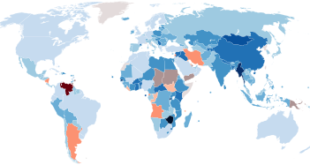CONTEXT:
The World AIDS Day is observed on 1 December every year all over the world.
MAIN POINTS:
- It was founded in 1988 by the World Health Organization (WHO) and was the first ever global health day with a motto of raising public awareness about Acquired Immuno Deficiency Syndrome (AIDS).
- AIDS is a pandemic disease caused by the infection of Human Immunodeficiency Virus (HIV), which damages the human immune system.
- In 2019, 6,90,000 people died from HIV-related causes and 1.7 million people were newly infected, with nearly 62% of these new infections occurring among key populations and their partners.
Theme for 2020: “Global solidarity, resilient HIV services.”
- On World AIDS Day 2020, WHO is calling on global leaders and citizens to rally for “global solidarity” to overcome the challenges posed by Covid-19 on the HIV response.
- HIV prevention, testing, treatment and care services are all being disrupted particularly in countries with fragile health systems.
- Slowing progress means the world will be missing the “90-90-90” targets for 2020, which were to ensure that 90% of people living with HIV are aware of their status, 90% of people diagnosed with HIV are receiving treatment, and 90% of all people receiving treatment have achieved viral suppression.
- Any slowing down in provision of these services will leave many vulnerable populations at greater risk of HIV infection and AIDS-related deaths and missing these intermediate targets will make it difficult to achieve the target of elimination of AIDS by 2030.
- In 2020, the International Year of the Nurse and the Midwife, it is a call for more protection and support to these health workers who have long been on the frontline of HIV service delivery.
IMPORTANCE:
- It reminds the public and government that HIV has not gone away and there is still a vital need to raise money, increase awareness, fight prejudice and improve education.
- It is an opportunity to show solidarity with the millions of people living with HIV worldwide.
SOURCE: PIB
 Chinmaya IAS Academy – Current Affairs Chinmaya IAS Academy – Current Affairs
Chinmaya IAS Academy – Current Affairs Chinmaya IAS Academy – Current Affairs



